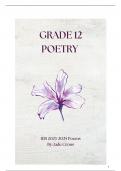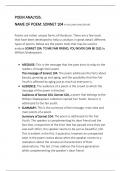Sonnet 104 - Study guides, Study notes & Summaries
Looking for the best study guides, study notes and summaries about Sonnet 104? On this page you'll find 14 study documents about Sonnet 104.
Page 2 out of 14 results
Sort by
 Popular
Popular
-
Poetry Analysis Booklet for IEB Poems
- Summary • 23 pages • 2024 Popular
-
- R150,00
- 1x sold
- + learn more
Delve into the intricate world of poetry with this comprehensive analysis booklet designed specifically for the IEB curriculum of . This booklet explores sixteen diverse poems, offering insightful interpretations and detailed analyses that cater to both students and educators. Detailed Analyses: Each poem is meticulously analyzed to provide a comprehensive understanding of themes, symbols, and literary devices. The Following poems are covered; Strangers forever, Sonnet 104, Go Lovely Rose, For O...

-
Matric poetry notes: 2023-2026
- Summary • 24 pages • 2023
-
- R150,00
- + learn more
Analyses of all 16 assessable poems for the matrics of . Notes cover theme, use of diction, figures of speech, structure, tone, quotes and explanations, etc. Covers all of the following poems: ◦Sonnet 104 ‘to me, fair friend, you never can be old’ - William Shakespeare ◦The Sun Rising - John Donne ◦Go, lovely Rose - Edmund Waller ◦Ozymandias of Egypt - Percy Bysshe Shelley ◦Remember - Christina Rossetti ◦nobody loses all the time - E.E. Cummings ◦Will it be so again...

-
Sonnet 104 Summary and Analysis
- Summary • 1 pages • 2023
- Available in package deal
-
- R75,00
- + learn more
In-depth analysis and summary of Sonnet 104 (according to The Complete Poetry Resource 7th Edition by the English Experience). It is handwritten and detailed.
The document analyzes the structure and poetic techniques used in the Shakespeare poem: Sonnet 104. It critically analyzes the poem by first describing each poetic technique and then discussing how and why it was used in the poem.

That summary you just bought made someone very happy. Also get paid weekly? Sell your study documents on Stuvia! Discover all about earning on Stuvia



